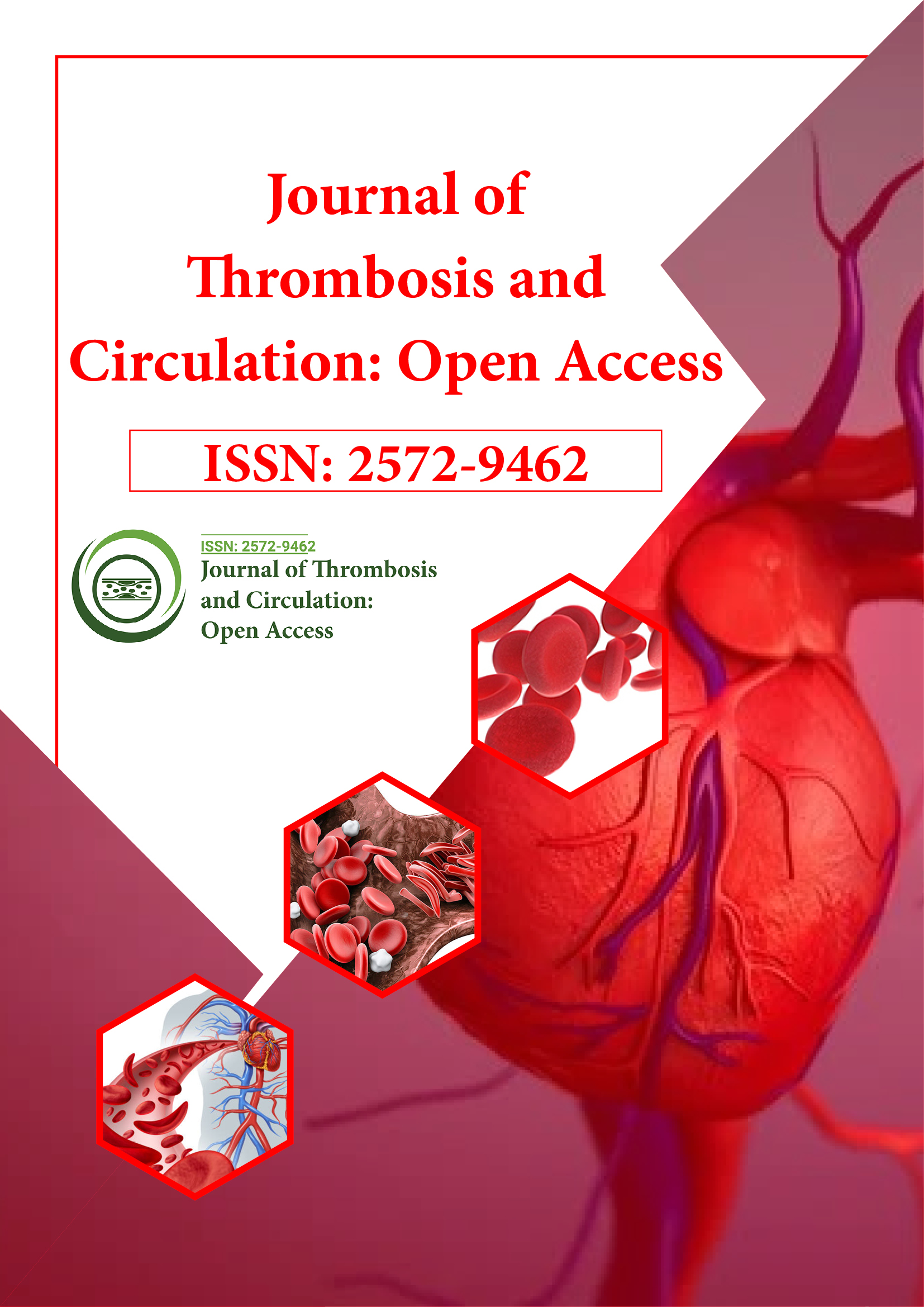Indexed In
- RefSeek
- Hamdard University
- EBSCO A-Z
- Publons
- Google Scholar
Useful Links
Share This Page
Journal Flyer

Open Access Journals
- Agri and Aquaculture
- Biochemistry
- Bioinformatics & Systems Biology
- Business & Management
- Chemistry
- Clinical Sciences
- Engineering
- Food & Nutrition
- General Science
- Genetics & Molecular Biology
- Immunology & Microbiology
- Medical Sciences
- Neuroscience & Psychology
- Nursing & Health Care
- Pharmaceutical Sciences
Perspective - (2024) Volume 10, Issue 1
Understanding the Role of Genetic Variants in Thromboembolism Susceptibility
Ruben Gerbes*Received: 01-Jan-2024, Manuscript No. JTCOA-24-25350; Editor assigned: 03-Jan-2024, Pre QC No. JTCOA-24-25350 (PQ); Reviewed: 17-Jan-2024, QC No. JTCOA-24-25350; Revised: 24-Jan-2024, Manuscript No. JTCOA-24-25350 (R); Published: 31-Jan-2024, DOI: 10.35248/2572-9462.24.10.269
Description
Thromboembolism, encompassing conditions such as Deep Vein Thrombosis (DVT) and Pulmonary Embolism (PE), represents a significant healthcare burden globally, contributing to morbidity and mortality. While environmental factors and acquired risk factors such as obesity and immobility are well-established contributors to thromboembolism, genetic predisposition also plays an essential role in thrombotic susceptibility. Advances in genomic research have led to a better understanding of the genetic underpinnings of thromboembolism, revealing novel insights into its pathogenesis and potential targets for intervention. This article explores the role of genetic variants in thromboembolism susceptibility, highlighting fundamental findings, challenges, and future directions in this rapidly evolving field.
Genetic basis of thromboembolism
Thromboembolism is a multifactorial disorder with a complex exchange of genetic and environmental factors. Genetic predisposition to thromboembolism arises from variations in genes involved in hemostasis, coagulation, and fibrinolysis pathways. Common genetic variants in genes encoding coagulation factors (e.g., Factor V Leiden, prothrombin G20210A), anticoagulant proteins (e.g., protein C, protein S, antithrombin), and fibrinolytic factors (e.g., plasminogen activator inhibitor-1) have been implicated in thromboembolism susceptibility.
Genome-Wide Association Studies (GWAS) in thromboembolism
Genome-Wide Association Studies (GWAS) have revolutionized the field of genetics by enabling comprehensive analysis of genetic variations across the human genome and their association with complex diseases, including thromboembolism. Large-scale GWAS have identified novel genetic loci associated with thromboembolism risk, providing valuable insights into the genetic architecture of the disease. For example, recent GWAS have identified genetic variants in genes involved in platelet function, endothelial function, and inflammation pathways as potential contributors to thromboembolism susceptibility. These findings highlight the multifactorial nature of thromboembolism and the importance of considering diverse biological pathways in genetic studies.
Functional consequences of genetic variants
Understanding the functional consequences of genetic variants associated with thromboembolism susceptibility is essential for elucidating their role in disease pathogenesis. Functional studies using in vitro and in vivo models have provided mechanistic insights into how genetic variants alter protein function, expression levels, or regulatory mechanisms within the coagulation cascade. For example, the Factor V Leiden mutation, a common genetic variant associated with increased thromboembolism risk, results in resistance to Activated Protein C (APC) and hypercoagulability. Similarly, genetic variants in the fibrinogen gene cluster have been shown to influence fibrinogen levels and clot structure, contributing to thrombotic risk.
Clinical implications and risk stratification
Genetic testing for thromboembolism susceptibility has important clinical implications for risk stratification, diagnosis, and management. Identification of high-risk genetic variants may enable early intervention strategies, such as pharmacogenomicguided anticoagulant therapy or lifestyle modifications, to reduce thromboembolism risk in susceptible individuals.
Furthermore, genetic testing may aid in the diagnosis of inherited thrombophilias in patients with unprovoked or recurrent thrombotic events. However, the clinical utility of genetic testing in thromboembolism remains a topic of debate, given the complex exchange of genetic and environmental factors in disease pathogenesis and the limited predictive value of genetic variants alone.
Despite significant progress in understanding the genetic basis of thromboembolism, several challenges remain to be addressed. These include the identification of rare genetic variants with large effects on thrombotic risk, the integration of genetic information with clinical and environmental factors for personalized risk assessment, and the translation of genetic discoveries into clinical practice. Furthermore, ethical considerations, including privacy concerns, genetic counseling, and informed consent, are essential in the implementation of genetic testing for thromboembolism susceptibility. Collaboration between researchers, clinicians, and policymakers is critical for addressing these challenges and leveraging genetic insights to improve thromboembolism prevention, diagnosis, and treatment.
In conclusion, genetic variants play a significant role in thromboembolism susceptibility, contributing to the heterogeneous nature of the disease. Advances in genomic research, including GWAS and functional studies, have provided valuable insights into the genetic architecture of thromboembolism and potential targets for therapeutic intervention. Continued research efforts are needed to unravel the complex exchange of genetic and environmental factors in thromboembolism pathogenesis and translate genetic discoveries into clinical practice for improved patient care.
Citation: Gerbes R (2024) Understanding the Role of Genetic Variants in Thromboembolism Susceptibility. J Thrombo Cir. 10:269.
Copyright: © 2024 Gerbes R. This is an open-access article distributed under the terms of the Creative Commons Attribution License, which permits unrestricted use, distribution, and reproduction in any medium, provided the original author and source are credited.
